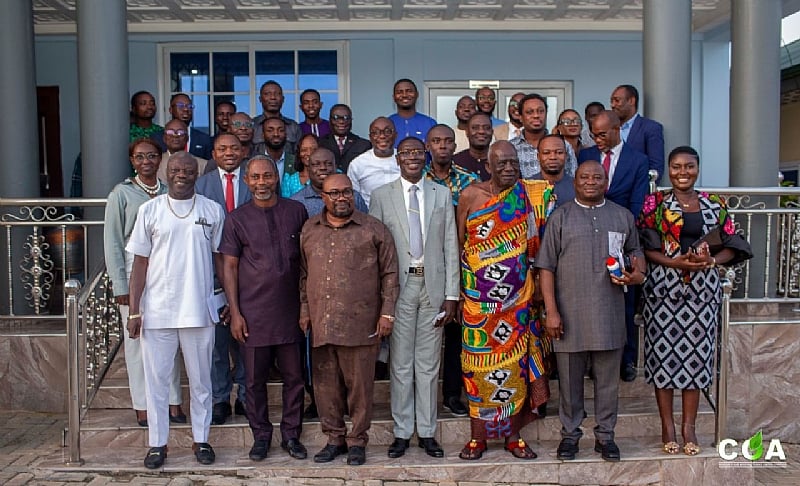Professor Samuel Ato Duncan, a prominent Ghanaian researcher and the Executive President of COA Research and Manufacturing Limited Company, has made a compelling case for government support in the further scientific investigation of his plant-based medicine, COA Mixture (specifically COA 72), which he believes holds immense potential for HIV treatment. During a visit by the Parliamentary Select Committee on Health to his manufacturing facility, Prof. Duncan emphasized the need for funding to conduct full-scale clinical validation of the mixture, highlighting its immune-boosting properties and promising results observed in individuals living with HIV. He asserted that the medicine, tested in both Ghana and South Africa, has demonstrated minimal side effects while significantly strengthening the immune system, positioning it as a potential game-changer in the global fight against HIV/AIDS. Prof. Duncan shared anecdotal evidence of the mixture’s efficacy in treating HIV and even colon cancer, citing cases where HIV-positive individuals using the mixture have given birth to HIV-negative children.
The potential economic impact of COA 72 was a key element of Prof. Duncan’s presentation. He estimated a potential annual revenue of $77 billion if the government supports further research, expansion of production, and subsequent global adoption of the injectable form of the mixture. He emphasized the facility’s capacity to produce two million vials per hour, underscoring the scalability of the production process. Beyond the financial gains, Prof. Duncan advocated for a collaborative approach involving researchers, policymakers, and private industry stakeholders to establish a robust phytopharmaceutical sector in Ghana. He also highlighted the importance of protecting intellectual property rights and providing incentives for innovators in traditional and plant-based medicine. His vision extends beyond a single product to establishing Ghana as a global leader in phytomedicine, creating jobs, and addressing public health challenges with locally sourced solutions.
The Parliamentary Select Committee on Health, led by Chairman Hon. Mark Kurt Nawaane, expressed strong support for Prof. Duncan’s research. Hon. Nawaane pledged to raise awareness within Parliament and advocate for government funding and infrastructure development to advance the research to the next level. Other committee members echoed this sentiment, testifying to the efficacy of COA Mixture, particularly Hon. Alexander Roosevelt Hottordze who used the mixture during the COVID-19 pandemic. Several MPs urged the government to consider integrating COA Mixture into the National Health Insurance Scheme (NHIS) to enhance its accessibility to vulnerable populations. They also proposed a partnership with Prof. Duncan to expand the on-site hospital facility at the COA Research and Manufacturing campus, envisioning its transformation into a world-class center for herbal medicine treatment and research.
Further bolstering the momentum for COA Mixture, Dr. Yusuf Yakubu, the Acting Registrar of the Traditional Medicine Practice Council, pledged his office’s commitment to supporting the scientific development and necessary certifications required for the mixture to reach the global market. This institutional backing underscores the growing recognition within Ghanaian regulatory bodies of the potential of COA Mixture and the broader field of plant-based medicine.
Professor Duncan’s advocacy for COA Mixture arrives at a time of increasing global interest in plant-based medicines, especially for immune-related conditions. While the mixture already enjoys significant recognition within Ghana and among some diaspora communities, its broader acceptance hinges on rigorous scientific validation that meets international medical standards. The visit by the Parliamentary Select Committee on Health signifies a crucial step in bringing national attention to the potential of alternative medicine within Ghana’s healthcare system and the potential of COA Mixture to revolutionize HIV treatment.
Prof. Duncan’s ultimate goal transcends mere commercial success. He envisions a transformation of Ghana’s healthcare landscape, positioning the nation as a leader in phytomedicine. This aspiration encompasses not only the development of potentially life-saving medicines like COA Mixture but also the creation of a thriving industry that generates employment opportunities and economic growth for the benefit of the entire nation. His pursuit of this vision represents a significant contribution to the ongoing exploration of plant-based solutions to global health challenges.
The potential benefits of COA Mixture, as presented by Prof. Duncan, deserve careful consideration and further scientific investigation. The anecdotal evidence and preliminary research suggest promising avenues for HIV treatment and other health conditions. However, rigorous clinical trials and scientific validation are essential to establish the efficacy and safety of the mixture conclusively. Government support, in the form of funding, infrastructure development, and regulatory facilitation, will be crucial in realizing the potential of COA Mixture and fostering a robust phytopharmaceutical sector in Ghana. This could potentially position Ghana as a hub for innovation in plant-based medicine, contributing to both national economic growth and global health advancements.


